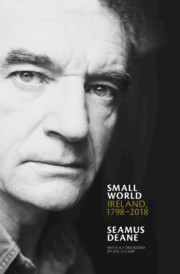'Seamus Deane was one of our greatest critics, sharp of mind and fearless in opinion. As this superb collection demonstrates, he had the large world of literature, and of Irish and Anglo-Irish literature in particular, secure within his frame of reference - there was no finer master of the art of close reading. Nothing small here, only the broadest view and the deepest insight. Ave magister.'
John Banville
'Over several decades Seamus Deane revolutionized the study of Irish literature and culture, and his critical innovations also helped to shape the fields of postcolonial and transnational studies. Combining theoretical brio with a scrupulous historical sense and dazzling breadth of learning, his distinctive voice - suave, wry, sinuous, incisive - made his pioneering insights unforgettable. Small World brings together some of Deane's most influential essays and adds exciting new work, especially on Irish women writers.'
Maud Ellmann - University of Chicago
'He was a product of a grand European tradition, now disappearing from the scene, in which the critic might at the same time be an intellectual. The combination in Deane’s case has leant a seriousness to his work that is unmatched among the burgeoning commentariat. Small World offers a panoramic overview of his development, exhibiting his sympathies and accomplishments. The book contains a compelling blend of history and criticism, marshalling Deane’s finespun amalgamation of disinterestedness and passion.'
Richard Bourke
Source: Dublin Review of Books
'The energy and intellectual fireworks peristed all his life, as this magnificent volume fully attests.’
Anthony Roche
Source: Irish Times
'Many moments in this collection convey the unique power of his voice; one hears as much as reads.'
Margaret Kelleher
Source: Sunday Independent
‘Irish writing, in Deane’s hands, becomes the lens through which matters of worldly import can be examined: in the wake of the Enlightenment and the French Revolution, the project of modernity in its various inflections (empire, capital, historicism, nationalism, the state of exception) is illuminated in the optic of Irish experience … His book is titled Small World, yet Deane was the most cosmopolitan of Irish critics. No other Irish critical voice would or could so suavely discuss Joyce in comparison with Broch or Gide or Mann. Deane had a unique power to read the world through the culture of a small marginal European island … But Small World is not a gloomy book. Refusing the foolish wisdom of resignation, it stands as a splendid testament to critique and to the intellectual vocation. With Seamus Deane’s death we have lost the critic, but his cogent thinking can and will be thought elsewhere, by others.’
Conor McCarthy
Source: Los Angeles Review of Books
‘… densely rewarding …’
Anna Mundow
Source: Wall Street Journal
‘It is impossible not to revere this anthology even without opening it.’
Josephine Fenton
Source: Irish Examiner
'This beautifully produced volume shows Deane at his most acute: an insightful and politically committed thinker.'
James Moran
Source: The Tablet
'Those in search of literary/historical/cultural nourishment could spend at least a year ingesting the compressed nourishment of Small World: Ireland 1798–2018 ...'
Jude Collins
Source: An Irish Quarterly Review
‘The chronological range of engagement is impressive, from the late eighteenth century to the present day, each essay displaying a depth of scholarly knowledge that brings weight to the unfolding arguments … Deane’s insightful commentaries opened Irish literature up to the rigour of theory.’
Derek Hand
Source: English Studies
‘This essay collection has many virtues it is well-written, jargonfree, ingeniously organised and packed with interesting content. It is also … a book that has arrived at the right moment.’
Carlo Gébler
Source: Society
‘Joe Cleary has done the world a great service with this book. He persuaded Seamus Deane to publish a collection of new and old essays, some of which date from the1970s and 1980s, and he guided the selection and arrangement of the contents.'
James Chandler
Source: Critical Inquiry



